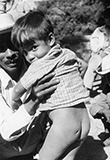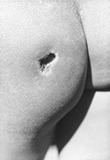Hesperian Health Guides
The Need for More Sensible and Limited Use of Injections
HealthWiki > Disabled Village Children > Chapter 3: Prevention of Disabilities > The Need for More Sensible and Limited Use of Injections

 |
| In most of the world, doctors, health workers, and the people make giving and getting injections too big a part of health care. |
The overuse and misuse of medicines in the world today has become a major cause of health problems and disabilities. This is partly because medicines are so often prescribed or given wrongly (for example, certain medicines taken in pregnancy can cause disabilities). And it is partly because both poor families and poor nations spend a great deal of money on overpriced, unnecessary, or dangerous medicines. The money could be better spent on things that protect their health—such as food, vaccinations, better water, and more appropriate education. Some medicines, of course, when correctly used are of great importance to health. But most are not. Of the 30,000 medicinal products sold in most countries, the World Health Organization says that only about 400 are needed.
How injections disable children
In many countries, injections have become the modern magic. People demand them because doctors and health workers often use them, and doctors and health workers use them too often because people demand them.

 |
 |
This child was injected with a needle that was not clean enough. The dirty needle caused an infected abscess (pocket of pus) that burst. The child had been injected for a cold. It would have been better to give him no medicine at all. |
When used correctly, certain injected medicines, like some vaccinations, are important to protect a child’s health and prevent disability. However, giving injections with an unclean needle or syringe is a common cause of infection and can pass the germs that spread HIV and other serious diseases like hepatitis (see Where There Is No Doctor, pages 399 to 401, and 172).
Dirty needles and syringes can also cause infections that lead to paralysis or spinal cord injury (see the story The Story of Jésica), or death. A needle or syringe must never be used to inject more than one person without first disinfecting it again.
Also, some injected medicines can cause dangerous allergic reactions, poisoning, and hearing loss. And the overuse of injectable hormones to speed up childbirth and “give force” to the mother is a major cause of babies born with brain injury.
How to clean and disinfect injection needles and syringes
Most syringes and needles are disposable (are used only once) and come in sterile packages. Some of them can be taken apart, boiled, and reused several times before they fall apart. We do not recommend this, but if you must reuse them, follow these instructions first:
- Put on a pair of heavy gloves to protect your hands.
- Draw clean water (or even better, mix 1 part bleach with 7 parts water) up through the needle into the syringe barrel. If you use bleach, make a fresh solution each day or it will not be strong enough to kill germs anymore.
- Squirt out the water or bleach. Do this several times.
- If you have used bleach, rinse everything several times with clean water.
- Take apart the syringe and needle and boil them in water for 20 minutes (as long as it takes to cook rice), or steam them for 20 minutes.
Note: For both boiling and steaming, start counting the 20 minutes after the water is fully boiling.
 |
To boil them, make sure water covers everything in the pot the entire time. If possible, put a lid on the pot. |  |
To steam them, you need a steamer pot with a lid (a pot with holes in it that fits inside another pot). Use enough water to keep steam coming out the side of the lid for 20 minutes. |
Storing your needles and syringes

When the needle and syringe have dried, store them carefully in a dry container, like a glass jar with a screw-on lid. Make sure these have also first been cleaned and disinfected. If you are not able to store them this way, boil or steam the needle and syringe again before use.

AVOID UNNECESSARY
INJECTIONS
The worldwide epidemic of unnecessary injections each year sickens, kills, or disables millions of persons, especially children. An international campaign is needed to re-educate doctors, nurses, health workers, traditional healers (many of whom also now overuse injections), and the people themselves. Combatting misuse and overuse of medicines is as important to health as vaccination, clean water, or the correct use of latrines. Health workers, school teachers, and community organizers should all work to help people weigh the possible risks and benefits of using any medication. For ideas on teaching about the danger of unnecessary injections, see Helping Health Workers Learn, Chapters 18, 19, and 27.


